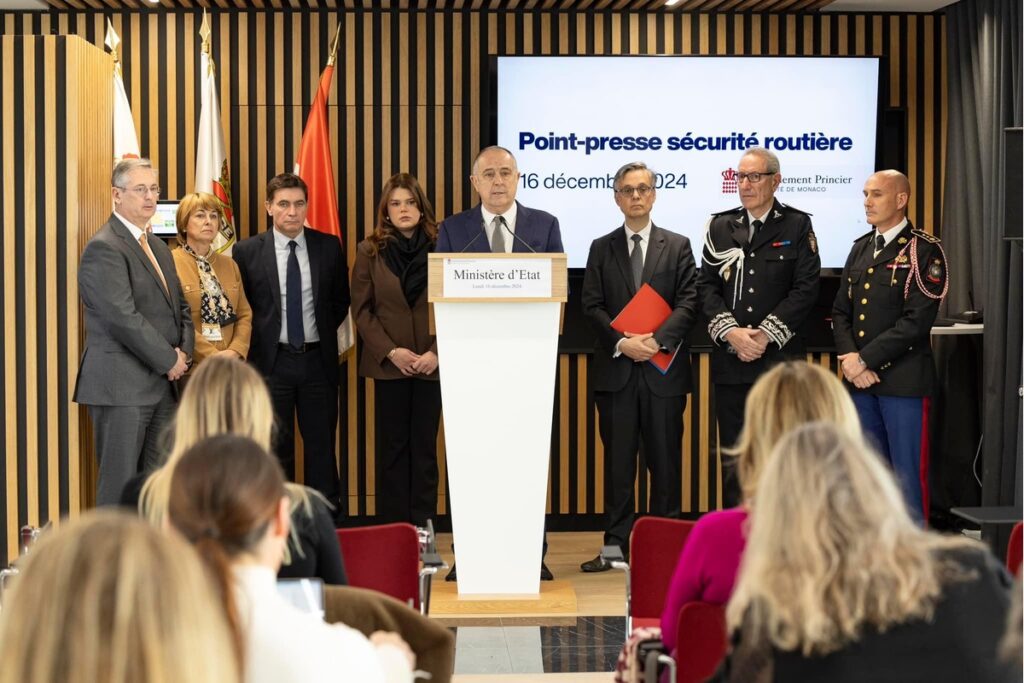Monaco cracks down on speeding and drink-driving

The government reacted strongly on Monday 16 December to two serious road accidents at the weekend involving alcohol and excessive speed.
“We are here to warn, to shout, to say that we are furious. Enough now, stop!” said Minister of State Didier Guillaume at noon on Monday 16 December in the Police Department’s premises. The Minister of State, accompanied by senior officials including Interior Minister Lionel Beffre, announced a number of measures to improve road safety.
On the night of Friday 13 December to Saturday 14 December, a vehicle caught fire on the access ramp to the Canton tunnel. The driver, who had an alarming level of 1.29 mg of alcohol per litre of exhaled air, escaped unhurt, but his two passengers were hospitalised and signed off work for 7 and 15 days respectively. Barely 24 hours later, another accident in the Louis II tunnel involved a driver who was over the speed limit and driving in the wrong direction. As a result of the crash, one of the passengers in the car that was hit was rushed to hospital.
In the light of incidents such as these, the Monegasque authorities vow to be uncompromising: “For the end-of-year festivities, checks will be stepped up considerably, with a very firm stance,” said the Minister. Police checks will be intensified, particularly in the areas identified as sensitive, namely Darse Sud, quai Jean-Charles Rey and Larvotto. Law enforcement will be targeting drink-driving and speeding. “Monaco cannot become a playground for drunk drivers looking for a thrill,” he added.
As of today, discussions will be taking place with nightclubs that sell alcohol and taxi drivers, to include them in the collective effort: “Help is available,” said the Minister. The government is also planning to distribute flyers in bars and restaurants to provide safety guidelines and promote solutions such as shuttles and taxis. A hard-hitting awareness campaign will also be rolled out in the coming days.
“Christmas cannot be a time for hospitals and death”
The Principality intends to combine preventive and repressive measures to ensure that Monaco is a place of celebration and joy, where the lives of its residents and visitors are not in danger. “This cannot continue. Christmas cannot be a time for hospitals and death,” said Didier Guillaume. The Minister for the Interior, Lionel Beffre, explained that a bill will be tabled in the coming month.
One of the aims of the bill is to increase the number of spot checks. At present, checks can only be carried out in the event of a serious accident or where there are visible signs of drunkenness. The future law will enable systematic checks. This bill will also create an offence of “deliberately endangering others.” This offence will make it possible to punish dangerous behaviour even when no accident has occurred. The bill also provides for stiffer penalties. Current penalties are deemed insufficient: “a fine of 35 euros is not a very strong deterrent for ultra-powerful vehicles,” they explained.
At present, a 30 kph excess speed ticket carries a fine of €75, or €35 if paid immediately. If the speed is 50 kph over the limit, the fine is 200 euros (or 100 euros if settled immediately). Drink-drivers face between one and six months in prison. These penalties are due to be increased to act as a greater deterrent.
Average speed cameras in tunnels
Another key measure: all Monaco’s tunnels will be fitted with average speed cameras. No precise details have been given as to the date of installation, but the aim is to reduce excessive speed and avoid acceleration in these critical spots.
Camille Gottlieb, President of the “Be Safe” non-profit, was also present at the announcement of the measures, and stressed the importance of prevention: “There is not enough prevention.It’s everyone’s responsibility to not let people who have been drinking get back in the car. Or get in the car driven by someone who has been drinking. There are shuttles to take people home safely. At Be Safe, we aren’t giving up.” Through her organisation, she advocates a joint effert between citizens, institutions and government to guarantee safe solutions for getting people home, such as shuttles.











